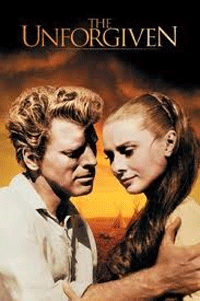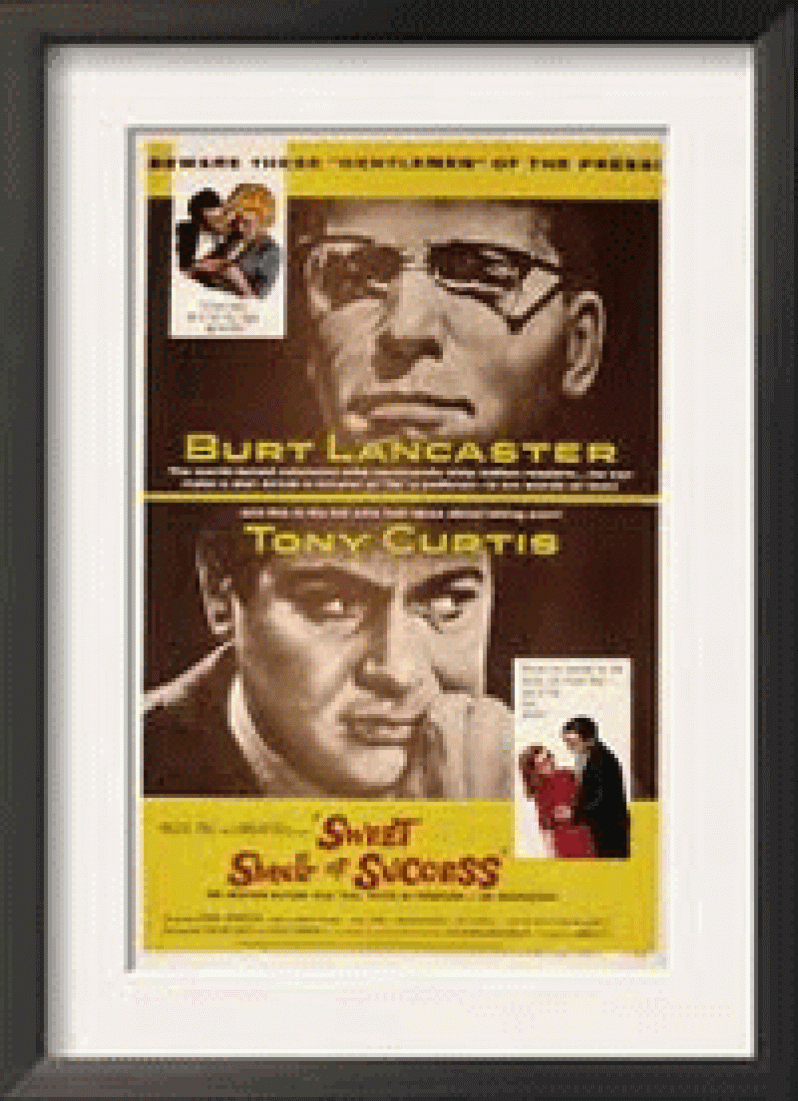BY 1957, it had become clear that Lancaster’s underlying value and power as an actor lay in a consistent choice of roles which confront and explore specific problems. Each Lancaster film is like a sortie into enemy territory to knock out some problem festering within society.  Sweet Smell of Success
Sweet Smell of Success
In 1957, after his exemplary lawman role in ‘GUNFIGHT AT THE OK CORRAL’, he appeared in one of his most intellectual and socially critical roles as the uncompromising celebrity columnist, J.J. Hunsecker, in director Alexander Mackendrick’s black-and-white masterpiece classic, ‘SWEET SMELL OF SUCCESS’.
Lancaster’s role is that of a powerful columnist, whose media fame and fierce criticism towards a crass commercialized entertainment industry makes him both feared and respected. What Lancaster injected into his role as Hunsecker is the convincing false front of someone seemingly heartless, while really acting as a mirror in which the psychological weakness of characters — from press-agents to politicians, to actors/actresses, and even family members — are revealed.
Lancaster’s big name in Hollywood would, in fact, be achieved by his refusal to be pushed around by projects, and subsequently to forming his own co-production company. But the proof of his multi-sided character was enhanced by his unique role in ‘Sweet Smell of Success’, which demonstrated one of the best aspects of Classic Hollywood’s modernist self-critical position, via some of its most interesting and effective films, such as Minnelli’s ‘THE BAD AND THE BEAUTIFUL’; Ray’s ‘IN A LONELY PLACE’; Aldrich’s ‘THE BIG KNIFE’; Humberstone’s ‘I WAKE UP SCREAMING’, etc.
Indeed, Lancaster, as a very physical, short-tempered guy, was also sensitive to being pushed around like an airhead by directors and film staff, and James Mangold, in his classic essay, ‘Afterwards’, about the making of ‘Sweet Smell of Success’, mentions one member of the set being told by an annoyed Lancaster while making the film: “I ought to punch you in the jaw right here and now!”
‘The Unforgiven’
In 1960, Lancaster found the film role that tackled racism from its roots in family and group-culture indoctrination, under John Huston’s relentlessly honest and  uncompromising direction of ‘THE UNFORGIVEN’ of 1960, which remains a unique and socially valuable Hollywood masterpiece relevant far beyond the American West. Lancaster, as the elder brother of the racially-biased Cash (played by Audie Murphy in his last powerful performance) and sister (unforgettably played by Audrey Hepburn), slowly comes to the realization that the sister he loves and protects all his life as his own is not really so by blood, but is an adopted Native Indian girl from the very tribe whose territory pioneer White families like themselves have settled in. Will she continue to be loved as a sister, or not?
uncompromising direction of ‘THE UNFORGIVEN’ of 1960, which remains a unique and socially valuable Hollywood masterpiece relevant far beyond the American West. Lancaster, as the elder brother of the racially-biased Cash (played by Audie Murphy in his last powerful performance) and sister (unforgettably played by Audrey Hepburn), slowly comes to the realization that the sister he loves and protects all his life as his own is not really so by blood, but is an adopted Native Indian girl from the very tribe whose territory pioneer White families like themselves have settled in. Will she continue to be loved as a sister, or not?
The greatness of ‘The Unforgiven’ is that its topic is blind racial exclusivity by both Whites and Indians. There are no heroes; no winners within the film itself. Only the sensitized film audience, who witness frankly the pitfalls of racial competition, rather than co-operation and progressive knowledge of the characters’ human capabilities.
Lancaster’s critical charisma
Once again, Lancaster’s responsible charisma makes him into a sane family member who learns through trial and error that familiarity and physical acceptance are more humanely satisfying than absolute ideas about racial and cultural preservation.
Significantly, the real exemplary hero, or heroine, of ‘The Unforgiven’ is the family matriarch, perfectly and suitably played by the great Lillian Gish, Lancaster’s, Murphy’s, and Hepburn’s pioneer mother who represents the rejection of racial possessiveness in both her family, her white neighbours, and the vindictive tribe which wants to reclaim their female ‘family’ member.
1960 is also the year Lancaster would receive an Academy Award for his role in ‘ELMER GANTRY’, a stunning film in which his famous characteristic convincing speech skills would expose the persistent social aberration of fraudulent preachers and conmen, whose sophistry misleads not only North Americans at times, but others anywhere.
‘Elmer Gantry’, directed by the daring Richard Brooks (of ‘BLACK BOARD JUNGLE’ and ‘SOMETHING OF VALUE’ fame) tackled another problem of social concern, which only those who know nothing of classic Hollywood’s social value would be gullible victims of.



.jpg)








